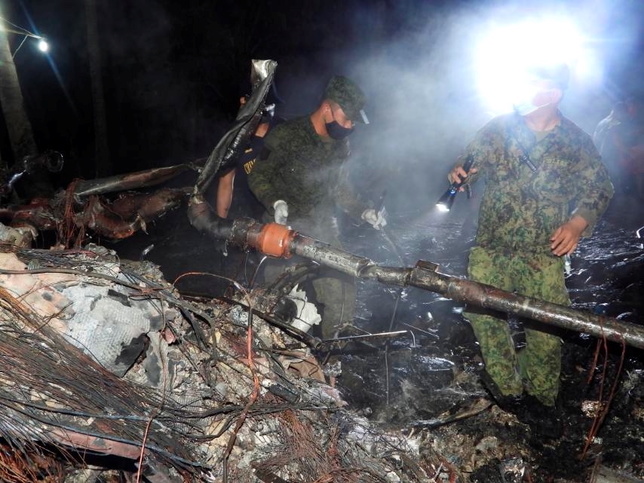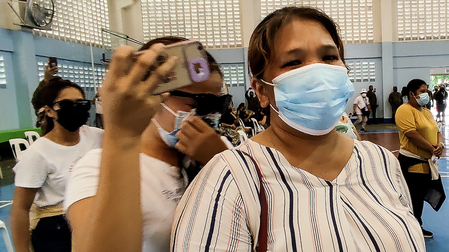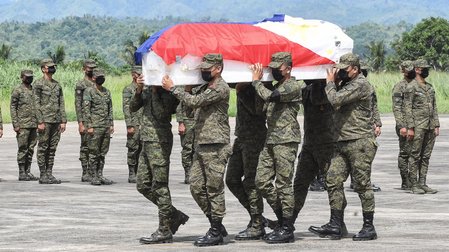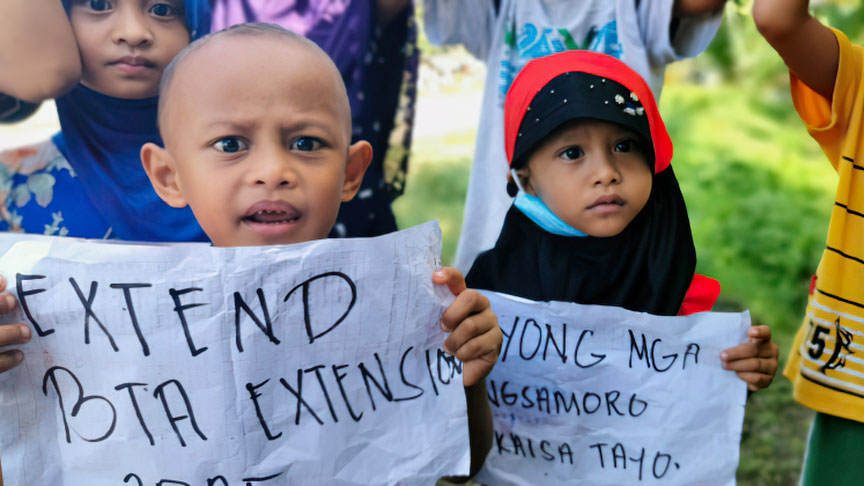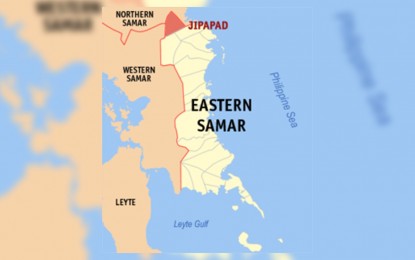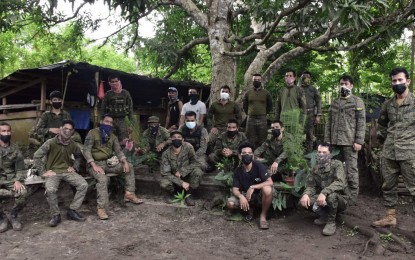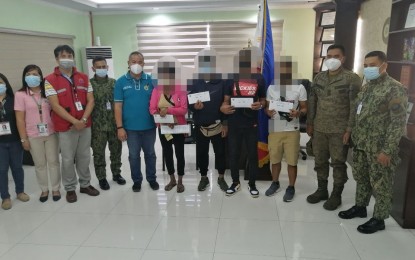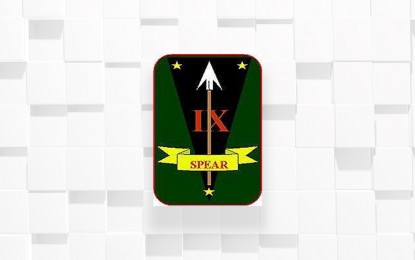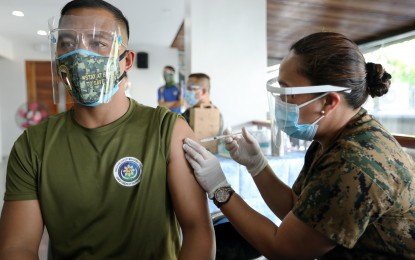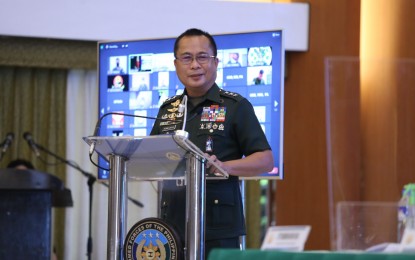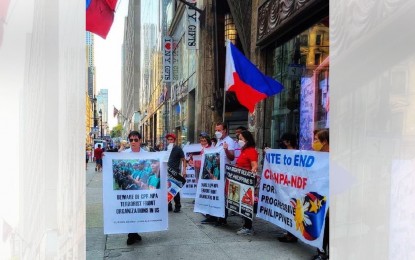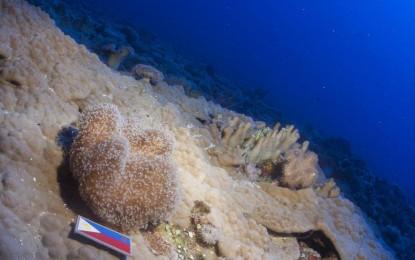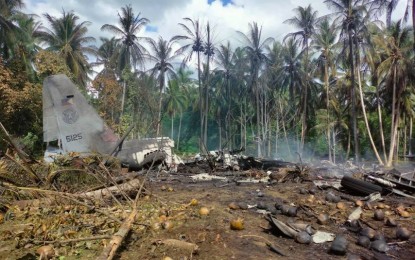Posted to Rappler (Jul 7, 2021): Terror tag by anti-terror council stands even if court disagrees – OSG (By LIAN BUAN)
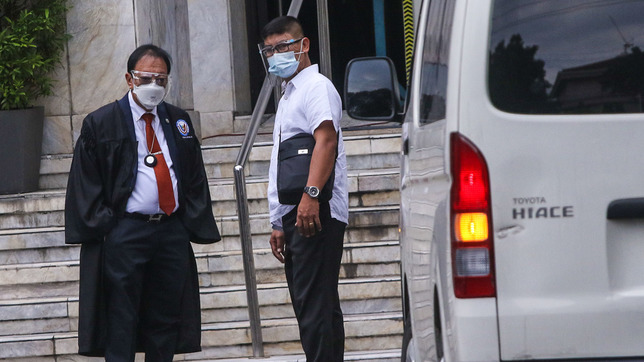 In memoranda submitted by the OSG to the High Court, it says, ‘Such person cannot insist on the protection of his/her reputation. The person has no one to blame but himself/herself,’ and any appeal should be taken up with the President
In memoranda submitted by the OSG to the High Court, it says, ‘Such person cannot insist on the protection of his/her reputation. The person has no one to blame but himself/herself,’ and any appeal should be taken up with the President
When Cabinet members unilaterally designate a person or a group as a terrorist, not even a court that disagrees with them can change it.
The Philippine government also told the Supreme Court (SC) that any damage to the reputation of a person or group tagged as a terrorist is the fault of no one else but the person himself or the group itself.
This was explained by the Office of the Solicitor General (OSG) in four volumes' worth of memoranda submitted to the SC on June 25. In total, the submissions, containing 812 pages, pertained to Supreme Court deliberations on whether the anti-terror law violated the Constitution and other existing laws.
The High Court grouped the 37 petitioners opposing the anti-terror law into six clusters so that it would have to review only six memoranda from them.
Designation as a terrorist is a highly contentious power under Section 25 of the anti-terror law. The law empowers the executive anti-terror council (ATC) to decide by itself to designate people and groups as terrorists without hearing their defense.
This is distinct from the proscription power of the court which goes through due process and which judicially declares a group a terrorist only after examining evidence.
ADVERTISEMENT
The Supreme Court asked the government: If the Court of Appeals (CA) eventually finds no probable cause to issue the proscription order, will the said organization be automatically delisted by the ATC?
The OSG replied: "No, it is not automatic."
"Rule 6.9 of the Implementing Rules and Regulations (IRR) provides that the denial of an application for proscription shall not be a bar to filing of another application against the same group of persons, organization or association if the subsequent application is grounded on new evidence," added the OSG in its memoranda.
The OSG said it can file a new proscription case after 6 months with new evidence.
CommunistsThe law's IRR also allowed the ATC to post on its
website the names of those it designated as terror groups or members of terror groups. The ATC has already done this to
19 people, including four peace consultants, whom it accused of being communists.
The Communist Party of the Philippines-New People's Army (CPP-NPA) has also been designated as a terror group, along with the Maute Group and individuals associated with the Abu Sayyaf.
The peace consultants have vehemently denied being members of the CPP-NPA.
The OSG said designation is an administrative act which "does not require prior notice and opportunity to be heard."
"When one is engaged in acts of terrorism, such person cannot insist on the protection of his/her reputation. The person has no one to blame but himself/herself for the measures that will be taken by the State to protect the public, one of which being designation," said the OSG.
A year after its passage and a year since petitions were filed against it, the law still remains in effect. The submission of the memoranda starts the countdown for the Supreme Court to decide on the law's constitutionality.
There is no hard and fast rule on how long it could take.
Freezing of assetsThe OSG confirmed in the memoranda that "several bank accounts" under the names of the 19 accused communists have been frozen.
Families of the peace consultants have slammed this move by the ATC. Among them is the family of Vicente Ladlad who said that the only significant source of income he had was his
compensation for being a Martial Law victim.Still the OSG claimed that freezing of assets was not an automatic penalty of designation, even though the law and the IRR both say "assets of the designated individual, group of persons, organization, or association under the Act shall be subject to the authority of the Anti-Money Laundering Council to freeze."
"To be clear, designation by the ATC does not automatically result in the freezing of assets," said the OSG. But in the same memorandum, the OSG said: "Designation is a preventive measure intended to trigger the issuance of a freeze order and the conduct of a bank inquiry."
The OSG insisted that the freezing of assets made sure the government stopped the financing of terrorism, which it said, was an integral part of combating the problem – stopping it in its preparatory phase.
PODCAST
[PODCAST] Law of Duterte Land: Captain Ri and all the president’s men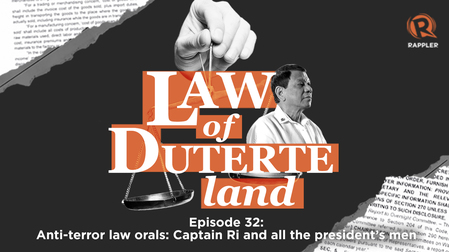 Murky areas
Murky areasThere are fears that designation could
go beyond frozen assets. For example, it could be used as a short-cut to convicting activists on trial in different courts for various offenses – such as the usual murder and illegal possession of firearms and explosives.
Another concern of the SC was this – even if the group was neither designated nor proscribed, other individuals could still be prosecuted since membership in a terror group is considered a crime under the law.
The justices asked: How do you punish a group's member if that group is neither designated nor proscribed? The OSG said that this was still possible as long as the group was found to be committing any of the acts specified in the law – among others, facilitating, providing material support, or inciting to terrorism.
And what was the standard to classify such acts, especially acts of protest, as terror acts? "Ultimately, the interpretation of what act or acts is/are intended to cause death or serious physical harm to a person, to endanger a person's life, or to create serious risk to public safety ultimately rests on the judiciary based on facts," said the OSG.
Because as the OSG said, even the ATC "does not resolve questions of fact."
The ATC's basis would be "a reasonable ground of suspicion supported by circumstances warranting a cautious person to believe that the proposed designee meets the requirements for designation."
MUST READ
'Dangerous': OSG says council can prolong jail time for non-terror offense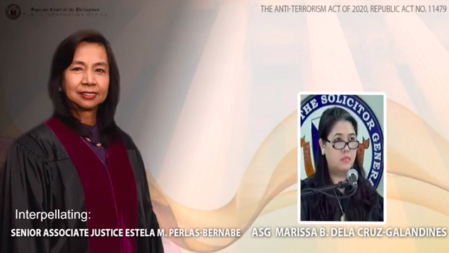 Nowhere to go
Nowhere to goAnd if those designated as terror groups or individuals want to challenge this, they must go to the President, the OSG said.
"The correct remedy from the ATC's decision is an appeal before the Office of the President," said the OSG.
The OSG, however, said those who feel they were unfairly labeled as terror groups or persons could still always avail of a judicial remedy, a petition for certiorari, or a petition seeking to void an action.
Cluster 2 of the petitioners against the anti-terror law said in a memorandum submitted to the High Court: How can this be an effective remedy when "the finding of probable cause [by the ATC] will be based primarily on intelligence and classified information, which may likely be of the hearsay, polluted, or inadmissible kind."
They also insisted that the text of the law makes it possible for designation to lead to arrest and detention.
And if the arrested or detained person based on designation files for an extraordinary writ, the writs will still fail because, according to the memorandum submitted by Cluster 5 petitioners, the language of the law "legitimized [the] arrest and detention of a person suspected of committing acts of terrorism without a judicial warrant of arrest."
All in all, "the Anti Terror Act mentions the right to effective judicial protection although it renders that right meaningless," said Cluster 3 petitioners in their memorandum.
https://www.rappler.com/nation/office-solicitor-general-terror-tag-stands-even-if-court-disagrees



